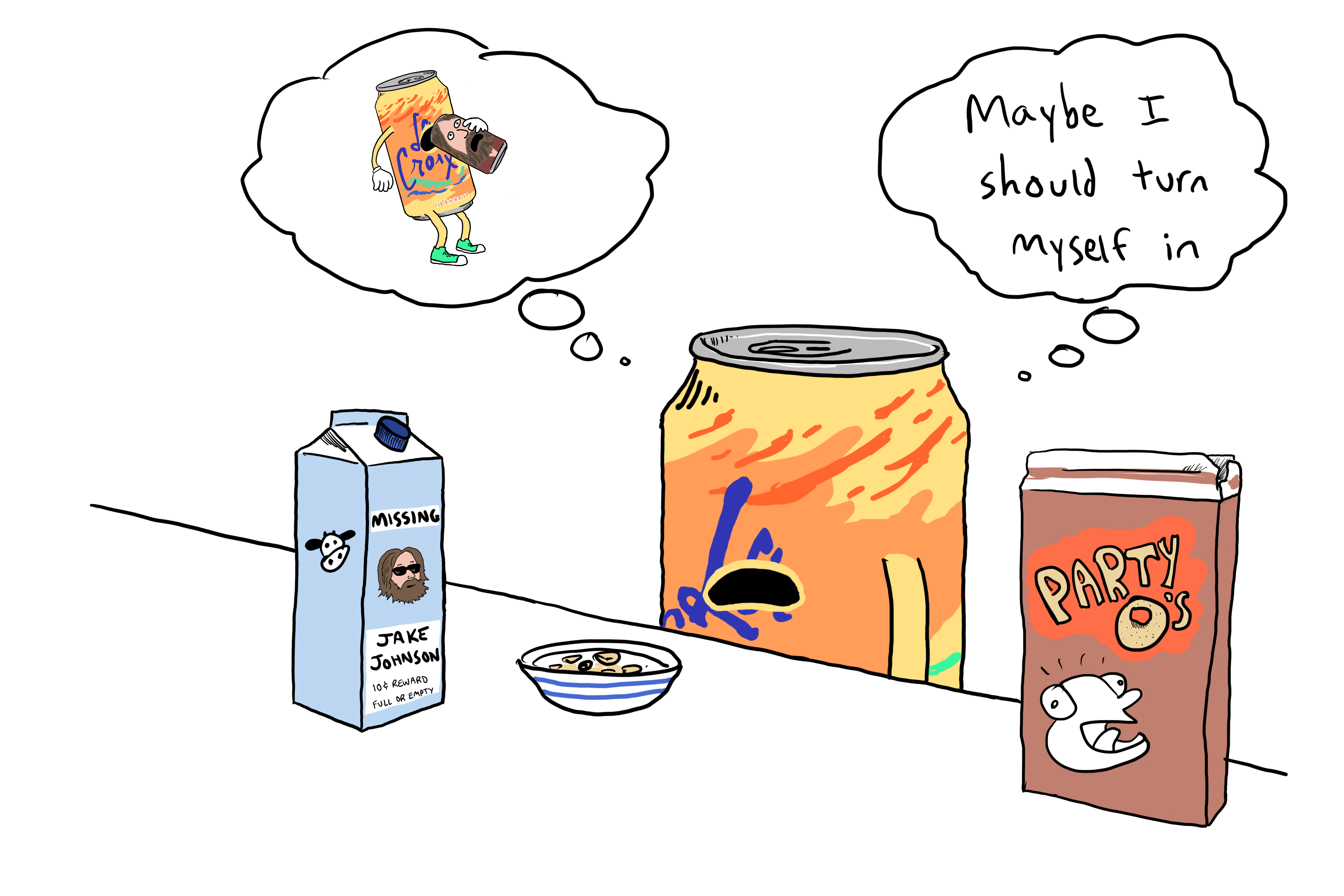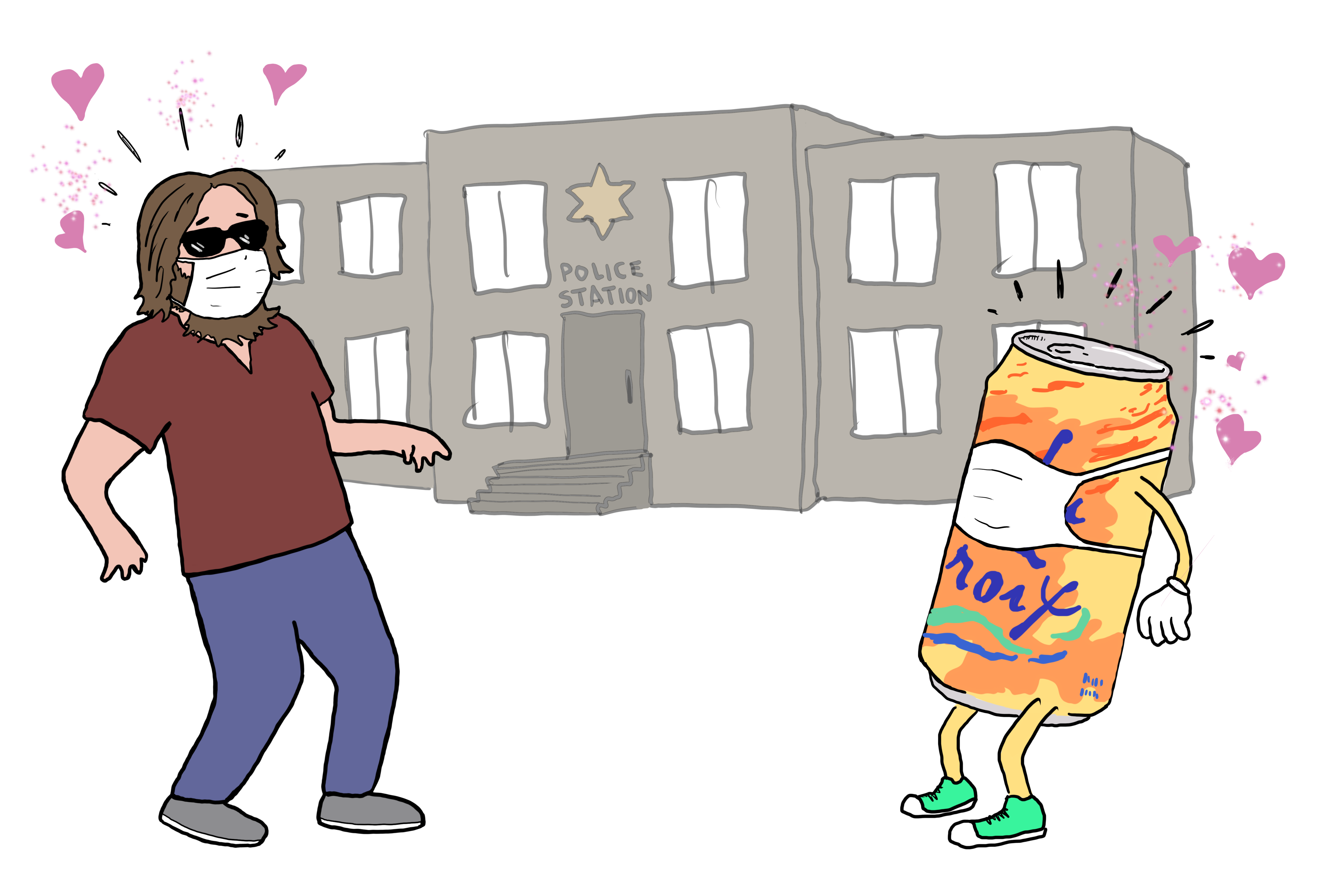George Floyd: Police respond to police brutality protests with more police brutality
Just when we thought the world couldn’t get any more intense, the killing of George Floyd by Minneapolis Police Officer Derek Chauvin sparked nationwide—and global—protests at a magnitude I certainly can’t remember in this country. Structural racism, disproportionate use of brutal force against Black people by police officers, and a refusal to hold police and racist actions by others accountable has led us here. And the people have had enough. Here in Portland and around the country we see American police recklessly and heartlessly terrorizing protesters, passersby, and the journalists who are covering protests. The president is trying to use the military to quell protests. Peaceful protesters in front of the white house were tear gassed and shot with rubber bullets to make way for Trump’s photo op at a church where he tried to figure out how you hold books.
I think this issue is an interesting sort of time capsule from the world just before this new moment, and it’s interesting to look back at now.
It’s Pride Month! Celebrate and remember that Pride exists because of the The Stonewall Uprising, a riot and protest for liberation from marginalization and targeted police violence against the LGBTQ community. Marsha P. Johnson, a Black trans woman, was one of the prominent people behind that movement. Johnson recognized the importance of supporting and standing up for each other. As Johnson said, there is “No pride for some of us without liberation for all of us.”
Black Lives Matter
Letter from the editor, May 25:
This is my last issue with The Sentinel, so I’m gonna spend a little more time with you in this letter than usual. I graduate in June, and maybe I’m a little sentimental, but this magazine has been my life for the past two years. It seemed there were two approaches to my departure from the magazine: the graceful disappearance, where I do my job like any other month and then vanish into the sunset; or spend a little extra time with y’all and write about it. It seemed like it might be a regretfully missed opportunity to not say goodbye, so that’s what I’m gonna do over the course of this three-page letter. (Three pages, has he lost his damn mind? Absolutely, and absolutely).
 illustrations by Josh Gates
illustrations by Josh Gates
2020 so far—pretty chill year right?!??!?
Like most school years, this one has been grueling, long, and is rapidly, suddenly, over. Unlike most years, 2020 has been completely and utterly batshit crazy: The year started with the unprovoked killing of an Iranian General in Iraq; there were the unprecedented impeachment hearings and acquittal of President Trump based largely as a result of a dangerous argument: if Trump leveraged hundreds of millions of dollars in military aid in exchange for personal political favors to help him get reelected that would neither be criminal nor unacceptable for a president to do; and finally, there is the arc of ye olde coronavirus.
Feb. 2: Trump said “we pretty much shut it down.” Feb. 26: Trump said “the risk to the American People remain[ed] very low” since there were only 15 cases in the U.S. at the time. March 9: Trump asserted that since the flu kills 27,000 to 70,000 people per year, the coronavirus was being overhyped. March 24: the lieutenant governor of Texas told Fox News that old people should be willing to sacrifice themselves to save the economy; later that day Trump said the cure can’t be worse than the problem—implying that the hit to the economy because of shelter in place orders is worse than letting hundreds of thousands of Americans die. April 10: Trump said we should be happy we’re only likely to lose 60,000 people to COVID-19 since it’ll be less than the previous estimates of 100,000 deaths. April 17: Trump tweeted support for protestors who rallied against stay at home orders—by blocking ambulances, and carrying assault rifles in government buildings, and wearing MAGA hats while waving Trump flags. April 27: Trump asserted that Illinois was one of the examples of states being poorly run by Democrats; on May 1st a protestor outside the Illinois state capital held a sign with the German phrase “Arbeit Macht Frei,JB” which translates to “work sets you free,” a propagandistic phrase the Nazi’s had on the gates of Auschwitz. April 29: Jared Kushner says that we should look at Trump’s response to the pandemic as a “great success story,” despite the near-million cases in the U.S. at the time. May 16: Eric Trump says that shelter in place restrictions around the country are a Democratic conspiracy to milk the pandemic in order to prevent Trump from holding campaign rallies. May 21: even with many citizens sheltering in place, COVID-19 has killed 93,061 people in the U.S.
For perspective, the U.S. and South Korea had their first cases on the same day, January 20, 2020. On May 1, South Korea reported no new cases. But a week and a half later there was cause for alarm when 54 new cases were reported and linked to the reopening of some bars and clubs. South Korea’s total case count is, as of May 21, 10,874 with 256 COVID-19 deaths. Their population is 51.64 million—relative to population size, that would be like if the U.S. only had 1,627 deaths instead of 93,061 and 69,110 cases instead of 1.6 million. Unlike our president and his associates, when South Korean President Moon Jae-in said the country set a global standard for its response to the spread of the coronavirus he had the credibility and numbers to show for it. Additionally, even though President Moon’s country has done an exceptional job at curbing the spread and preventing unnecessary death, he has still cautioned the country to be prepared for a “prolonged war” with COVID-19.
But it’s not only that, at least half the people I know are currently out of work. The unemployment rate in the U.S. as of May 21 is 14.7%. This is the highest official rate on record in the country’s history—in 1933 it is estimated that rate was around 25%—and The Guardian predicts that the current number will rise above 20% in the coming months. Vice reported that 24% of people in the U.S. didn’t pay their rent or mortgage in April and 31% didn’t pay in May. Meanwhile the stock market seems to be doing just fine after realizing that just because American workers are struggling doesn’t mean they have to be. As a result of the COVID-19 pandemic, Jeff Bezos’s wealth is estimated to have risen rather significantly: from the start of the pandemic to the middle of April by $24 billion.
In April, the defense department brought 85 refrigerated semi-trucks to New York City so they could be converted into “makeshift morgues” to temporarily store and transport dead bodies that were piling up in hospitals from COVID-19.
States are beginning to reopen parts of their economies, but we should all be careful and continue to be flexible. Unfortunately, this pandemic doesn’t seem to be in a hurry to give us much of a break. Every step toward reopening presents an opportunity to royally fork ourselves. Customers are getting upset at safety guidelines, but these safety guidelines are here to protect us. Be nice to retail, restaurant, grocery workers, USPS mail carriers and clerks, sanitation workers, and others you encounter; give them space, wear face masks, wash your hands, and bring hand sanitizer around if you can. We’ve done this well in Oregon by being safe, no need to throw it all away now.
Optimistically, there is less traffic on the roads. While many people like going into the office, the pandemic has proved that there are tons of workers who don’t technically have to go into the office to do their jobs. We should hang onto this by continuing to allow and encourage workers who can work from home to do so. This would net huge preventative health positives in the prevention of normal diseases like the flu and common cold: if you think you might have a cold, maybe you don’t have to go into your tiny office and spread it to the other workers trying to scrape out a living selling air filters over the phone, Karl.
So long and thanks for all the fish
Over the past four academic years I have learned an incredible amount about the world and myself as a result of my education at Portland State University. Three and a quarter of those years have been spent dutifully winding my way down into the sub basement of SMSU to participate in student media’s journalistic pursuits.
When I came to PSU for my orientation, I noticed there were some typos, silly mistakes, or even stylistic choices that could have been improved in what appeared to be the school’s weekly newspaper. It was Portland State University Vanguard’s “Orientation Guide 2016.” I thought I could help copy-edit or make myself useful in other ways; it turns out the applications were reviewed by the author of a piece I had marked up pretty bad—which went over as expected (not well). I don’t remember hearing anything back. I came in full of foolishly unmerited self-confidence. Maybe that was the real reason I didn’t hear anything back, maybe there was some arrogance that came through in my application.
Over Christmas break I ran into the Editor in Chief of The Vanguard at a karaoke place, she told me to send in another application. I worked hard on my application and writing samples. A little while later I was hired and started out in the News section, reporting on such fascinating goings on as ASPSU Senate and board of trustees meetings.
For those of you who have been a part of making PSU’s Student Media as dynamic as it is, I can’t thank you enough; and thank you all for making me feel like I vaguely had a second home down there. Thank you to all the editors and contributors who have worked for The Pacific Sentinel over the past two years, it’s been a wild ride and we’ve made a ton of really great stuff that we should all feel really proud of. Yes, thank you to each and every one of you, yes you, from the bottom of my heart I am deeply humbled and grateful.
Join student media
If you like what you encounter in The Pacific Sentinel and The PSU Vanguard and think that it is a pretty cool thing we do and that maybe you would want to see what it’s like to work in journalism I can’t encourage you strongly enough to apply. It’s hard to picture my education experience at PSU without student media. Before I was hired at The Vanguard in winter 2017 I felt like I could fade in and out of my experience at PSU. I had a ton of time and not much connection outside of my classes. Yes, I was making more money before I spent most of my time working for student media publications, but now, three and a quarter years later, I have an entirely new skillset and confidence in my ability to produce engaging articles, understand reporting, and ability to write and edit compelling articles to make them as effective as possible.
The writing, research, and self-advocacy I have learned at PSU is largely due to my experience in student media. I am a much more well-rounded person, not just in skillsets and pant size, than I was before I started. Thanks to my experiences in student media I have interviewed, encountered, and analyzed the perspectives of many more people and situations than I would truly care to count. All of that experience has made my state school tuition price feel like a goddamn steal. Also, we pay you to work for The Pacific Sentinel and The Vanguard.
It is easy to understate just how much more effective my written and verbal communication skills have become since working for these publications. Not only did I need to become effective at gathering data, information, and perspective about stories, I also needed to figure out how to cut them down and how to make sure the information I was creating was written in a way that could be understood. These are skills I learned in the sub basement and out working on assignments. Just because we’re trapped inside for a while doesn’t mean there aren’t opportunities to learn about journalism, there definitely are.
If you want to be a better writer, storyteller, researcher, photographer, videographer, designer, illustrator, manager, and maybe even develop better people skills… I am literally incapable of telling you how much opportunity exists in the, now virtual, sub basement. They even have a drone, so the sky could literally be the limit—well, whatever the max altitude of the drone is would technically be the limit.
Join us, rack up some sweet published work for your portfolio, CV, and resume. Wins all around.
Looking ahead
I am very excited about the magazine’s leadership and life moving forward. Vivian Veidt is taking the reins as Executive Editor of The Sentinel and I know that it will be in good hands. Vivian is organized, incredibly smart, knows words a lot better than I do, and has a strong grasp on the importance of ethics and responsible journalism. Haley Riley has not only done an incredible job for the design, production, and growth of her team but she is also a fierce advocate for the designers, illustrators, and photographers that work for her. Our Opinion, Arts and Culture, and News sections have consistently been raising the bar month after month and I am consistently blown away by the compelling and engaging articles and reporting that they do.
Thanks y’all, can’t wait to see what you do,
Here’s to you, here’s to June.
June 2020
This issue is jam-packed. Our contributors and editors have really stepped things up to send you into the summer with a lot of incredible articles to read and have truly given us all a lot of important things to think about.
We’re going to hear about some more COVID-19 updates. As a short side note: we talked about burnout last issue, there is a lot of rough news out there. Make sure to give yourself the mental space to be okay during all this, but also make sure to check in every once in a while to be aware of what’s going on. Ignorance is bliss, but knowledge is power—strike a healthy balance.
We take a look at how the spread of coronavirus is affecting prisons and jails, incarcerated people, and the communities around those institutions of incarceration; a major pandemic takeaway: even if you’re a cold-hearted monster who doesn’t care about the health of people in the criminal justice system, their health affects your health and the health of those you love, too. In a further look at the criminal justice system one of our writers talks about the reasons that the death penalty is ready to be a spectre of the past.
As we are all part of this educational institution, we examine the ways the switch to remote learning is affecting our education systems, educators, and students. Virtual commencement is pretty controversial, we definitely hear you; so we’ve got three articles hashing out whether or not PSU’s decision to host the class of 2020’s graduation via a live-streamed glorified slideshow was the right choice (as a side note, at a press conference on May 23, PSU Interim President Stephen Percy said that PSU is working with ASPSU to figure out some other way to celebrate the class of 2020 in addition to the virtual ceremony).
Speaking of being stuck at home and not being able to gather in places, local businesses are having a tough go of things: We look at how some movie theaters are adapting during this crisis; we stop into Portland’s Cal Skate skateboarding shop while trying to figure out whether or not skateboarding during quarantine is a crime or just healthy exercise like biking and running that is okay to do; and we take a look way back at one of Portland’s most notorious controversies: white people profiting off of other cultures by appropriating their food—while we all had too much fun with this three years ago, it is in fact not too soon, and the pandemic has added extra layers to the story.
Many people have opted to reenact the Great British Baking show in their own homes during Oregon’s “Stay Home, Save Lives” order, including one of our writers who talks about the cultural legacies and connections we have to ancient history when we bake sourdough.
A curveball has been thrown into the zeitgeist by one of our writers who has never shied away from measured stances about controversies; they explain to us why James Bond should remain 007, and that the character should continue to be portrayed by a white man. The writer alleges that if we want to point the finger of inequity anywhere, it should be at ourselves for being too lazy and uncreative to create a new, equally, or more, compelling series for people of color and women to portray the leading roles in.
Another author has created a compelling piece of satire. The piece exists as a result of the very real reality that Trump is widely supported by zealous evangelicals of the religious right. In a not so subtle jab, the author creates a debate between Josh Cohen and Ronald Schmuck. Cohen debates the schmuck through the adaptation of bible verses which would seem to contradict Schmuck’s worldview, leadership style, and concern for humanity.
We take a look at how neoliberalism has been working out, examine the cultural phenomenon of Tiger King, and talk about why continuing to care is important. We also take a very enlightening tour of the way the medium of film has been used to disseminate ideas about labor unions: some really great, some really bad, some just absurd propaganda.
I’m incredibly proud and impressed by the work that went into this issue and I truly hope you enjoy reading it as much as I have.
Party on in a socially distant fashion and take care of yourselves and each other,
Signing off forever,
<3 Jake Johnson
Executive Editor





